Welcome to another offbeat and erudite edition of Fairytale Sunday!
I wanted to get this one done for today because it’s the closing day of the Games in Paris. Of course you will be wondering what the Jeeves this has to do with fairytales but as always, stick with me and all shall become clear.
Now, as you are probably aware there was something of a hoohah concocted as a result of a certain segment of the opening ceremony involving a gaggle of LGBT types and drag queens and all that postmodern jazz. Specifically, this was all conjured up, almost on cue, by the usual suspects in the American far-right pseudo-Christian evangelicals. Well, I don’t see anything ‘Christian’ about them, and as you will come to understand as we progress with this cool essay the irony here is a gift that keeps on giving.
And as they say, beware Greeks bearing gifts.
Anyhow, this is a photo of the tableau vivant that provoked all these bigots:
I’m claiming free use for educational purposes on that one, by the way, in case some officious little shitler tries objecting.
The pseudo-Christian bigots in question, swiftly joined by a chorus of other pseudo-religious types from other branches of the monotheistic ideology, mistakenly assumed that this tableau vivant was an insulting parody of the well-known painting by de Vinci called The Last Supper (c. 1495-1498), which looks something like this:
So that all kicked off on the Saturday 27 July following the previous evening’s opening ceremony. The following day, however, the auteur himself of this segment, Thomas Jolly, issued a correction and explanation, stating quite clearly and understandably that it was not at all based on The Last Supper, but rather a story from classical mythology known as The Feast of the Gods. Not that this saved him and some of the artists involved from death threats. This story, which forms the subject matter of this edition of Fairytale Sunday, has been a popular subject for many of the great masters of art stretching back centuries. One of the main reasons, of course, is that it provided them an excuse to be transgressive, and in part two of the story, as we’ll come to in a moment, a further excuse to paint three beautiful nudes. And you can be sure they really did use three beautiful naked women. These artists are men, after all.
Don’t worry, though, I shall avoid going feminist on you for this one.
Anyhow, the particular version of The Feast of the Gods referenced in this segment was the following, by the Dutch master Jan van Bijlert (c. 1635-40), which looks something like this:
It’s in the Musée Magnin in Dijon, if you’re ever in the area.
One thing that I am not alone in being irritated by is that the French organisers actually issued an apology ‘for any offence caused’. I’m sorry (well, I’m not, actually), but you should not only never apologise for something you haven’t done wrong, but you should absolutely never apologise to a bunch of fucking ignorant bigots! As that Guardian article linked above mentions, Hugo Bardin, also known as the drag queen Paloma, who featured in the scene, expressed his own disappointment that Paris 2024 had apologised. Quite right too.
Anyway, that’s the intro and background out of the way. Now let’s talk about irony.
Personally, I am becoming minded to believe there is a clear proportional correlation between the understanding of irony and level of education. Of course it has to be the right kind of education, for sure, and what passes for ‘education’ these days is little of the sort. Far from it being a ‘leading out’ of ignorance and into enlightenment, it’s precisely the opposite – a ‘leading in’ to narrowly defined parameters of acceptable dogma. An ‘induction’, in other words.
On the other paw, it is invariably the case with bigots that they will find any excuse to indulge their bigotry.
But in this instance, the levels of irony are off the scale.
I shall try and deal with each one in turn.
First, let’s talk about ‘discord’. Here’s where we get into the fairytale bit, as you will hopefully notice when I briefly describe the story from classical mythology which is the subject of all this hoohah. And for all you conspiracy theorists out there, if you wish to interpret this as yet another example of ‘revelation of the method’ then don’t let me stop you. Unless of course it’s just ironic Gallic humour.
So, the Feast of the Gods in fact refers to a feast for the wedding of the Nereid Thetis to the mortal hero (and Argonaut) Peleus. Together, ironically (there’s a lot of it about, trust me), this couple are the parents of Achilles, the hero of the Trojan War. A gaggle of Olympians were invited, as you should be able to see from the photo at the top. Barbara Butch, the fat lady in the centre (I haven’t heard her singing, by the way) with the halo represents Apollo (associated with the sun), the blue-painted bloke (Philippe Katerine) is Dionysus, then there’s Poseidon with his trident, and so on. You get the picture.
However, there was an uninvited guest. Her name was Eris, Goddess of Discord (for all you Neil Gaiman fans if she shouldn’t be the eighth member of the Endless I don’t know who should!). Zeus didn’t want to invite her for obvious reasons. Eris, then, decided to take her mischievous revenge as a woman scorned by getting an apple from the Garden of the Hesperides, inscribing it with the word ‘Kallistei’ meaning ‘for the most beautiful’ (or ‘fairest’, even) and casting it onto the table. This caused a quarrel between Hera, Athena, and Aphrodite, all of whom aspired to be seen as the most beautiful. To adjudicate the matter, Paris was called upon.
See where we’re going with this, reader dearest? Yeah, sure you do!
The patriarchal types would take pleasure in the idea that all three of these women resorted to bribery to gain the favour of Paris’ judgement. Hera offered to make him king of Europe and Asia whilst Athena offered him wisdom and intelligence in war. A feminist, however, would point out that the bribe which did it for Paris was Aphrodite’s, who offered him the hand of the most beautiful woman in the world, who’s name just happened to be called Helen.
And we know what the consequence of Paris and Helen was, don’t we?
So, for all the conspiracy theoretically-minded, should we call this a mischievous prophecy of impending war, and the revelation of the method? Or should we just call it postmodern irony?
Or could it all be a Discordianist plot, like ‘Operation Mindfuck’. Yes, that is a real thing, and has something to do with the Illuminati. Discordianism is a pseudo-religion based on Eris. See the link for amusing details. I’ll not clog things up with it here, though.
In these Games in Paris, of course, there was indeed an uninvited spurned guest, namely Russia and Belarus (I believe some did decide Russian mischief was responsible for some issues with the SNCF). And yet Israel, as has been pointed out by far too many people for me to even need to provide you with any links, was invited, despite clearly committing genocide in full view of the entire world and, well, you’d think that kind of thing was a direct violation of the entire Spirit of the Games and the Olympic Charter, wouldn’t you? It’s the hypocrisy and inconsistency which is emmerdant. The fact that every single day during these Games Israel has been mass-murdering innocent children in Gaza doesn’t seem to bother the so-called Olympic Committee.
But let’s not go there. It would spoil things.
Let’s have a beautiful painting instead.
The Judgement of Paris (1812) by Guillaume Guillon-Lethiére
The irony, then, lies in the discord, the sown seeds of which are ubiquitous at Paris 2024.
On a brighter note, something of poetic justice was achieved, along with a perfect end to one of the subplot narratives at these Games, by the victory of the Algerian boxer, Imane Khelif, following all the vile attacks on her femininity by the usual bigots. Interesting no one ever said anything similar about Katy Ledecky.
Anyway, those familiar with fairytales will have already recognised the tropes. The spurned guest and the quarrel over who is the fairest. Sleeping Beauty and Snow White are the most obvious which spring to mind.
We have already covered in the previous Fairytale Sunday how much of classical mythology survived into the more Medieval folk tales with which people today are familiar, and this present one is no different.
One thing I would strongly argue for here relates to the concept of cultural identity and its survival in the face of repression. A significant element of a human identity, after all, lies in the identity of the social group in which they belong. This is what I define as ‘cultural identity’. So my argument is that from a deep point of view fairytales and folk tales are a method of preserving the survival of the pre-Christian, Pagan cultural heritage of the peoples of Europe in particular.
Which is the further irony. It should not go unnoticed that these ‘monotheists’ are amongst the most bigoted and prejudiced and intolerant of people. So much for a religion professing love! And for every action there is an equal and opposite reaction. Normal human beings do not like to be corralled and told what they can and cannot think, or feel, or believe – or be, even. And so they find ways to rebel and preserve their identities.
Let us call this ‘transgression’.
We find it in all these works of art using pre-Christian themes as their subject matter. The viewer of those works of art would’ve either already recognised the story of the wedding of Peleus and Thetis and the Judgement of Paris, or they would want to know and thus educate themselves. They would see the figure of Dionysus prominently and know what he represents. Transgression and the God of everything which ‘Judaeo-Christianity’ seeks to call ‘sin’. That which, at the basic level, represents humans being happy with each other.
And here’s a further irony – this equally applies to the original Jesus. Jesus was nothing if not ‘transgressive’ (which is what got him killed, of course). He was a threat to the authorities precisely because he undermined their so-called authority. Fundamentally, Jesus said ‘God is within’. The authorities said ‘God is up there’ and ‘you must obey Him’. There is a separation of man and the divine in those so-called religions which, at their core, are merely methods of social control and the prevention of maturity.
To be fair, a similar aspect is present in orthodox Ancient Greek religion, in which, for example, imitation of the gods was strictly forbidden for mortals. So, we have the mystery schools, including that of Dionysus, which encouraged the acolyte or initiate to achieve wisdom and enlightenment precisely by associating themselves with the God. Orphism is a liberation, as we discovered previously.
Jesus would’ve been well-aware of this, I would imagine.
And I have, of course, made no attempt to hide my own scorn for the repressive version of these religions. Eat the apple, indeed!
And it is yet another irony that many of these ancient Pagan ideas were subsequently projected onto him. Namely the birth around the winter solstice (as with Dionysus) and the resurrection at the spring equinox. This likewise creates an association with the sun, or Apollo.
Perhaps we might even see fairytale tropes in the story of Jesus – born to a humble woodcutter and his wife (well, carpenter is close enough), but who is actually a prince, visited by three wise men bearing gifts (fairies), and there is certainly a lot of magic in all those miracles.
But naturally, all of this genuine education is lost on these bigots. That’s why I call them ‘pseudo-Christians’. Where the ‘original’ Christianity was gnostic and transgressive, within a few centuries it had been successfully infiltrated and appropriated and then twisted into yet another method of social control by the self-styled authorities.
And so it is today.
And so it would have been in the Middle Ages. So that’s my argument here – folk tales and fairytales are a survival of the necessity for transgression within an authoritarian society. They preserve the magic, and the harmony with nature. The personifications may change – deities being replaced by fairies, for example (Eris being the ‘bad fairy’ who places a curse) – but the symbolisms are the same.
And as I have said, people understand themselves and the world through stories. Preserve these stories, and you are educated, and your cultural identity survives.
So of course it’s transgressive. It is supposed to be so. And the irony here being that the very people who objected to this tableau vivant are the very ones representing the oppressive, repressive Establishment. And yet, they have no understanding of the why of that irony.
They know not what they do? Of course they don’t. But forgive them? Respect them? Whyever would you show any respect to that which shows no respect of its own?
Écrasez l’infâme!
Le Jugement de Paris (1924) by George Barbier
For the next edition of Fairytale Sunday, with some lovely memories of Atlantis, click there…

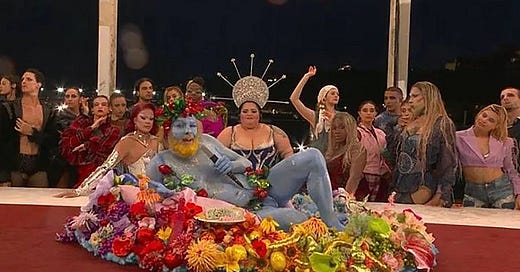



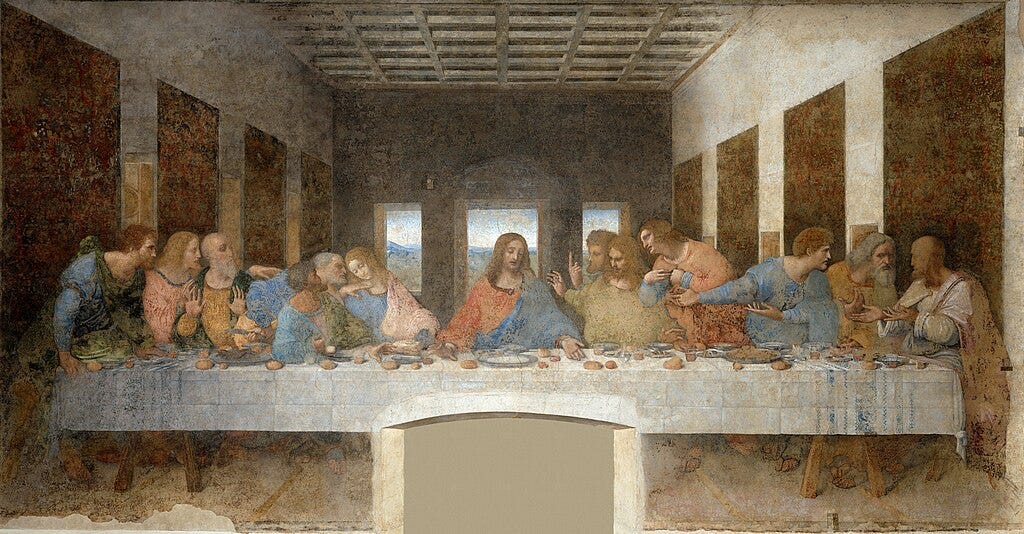
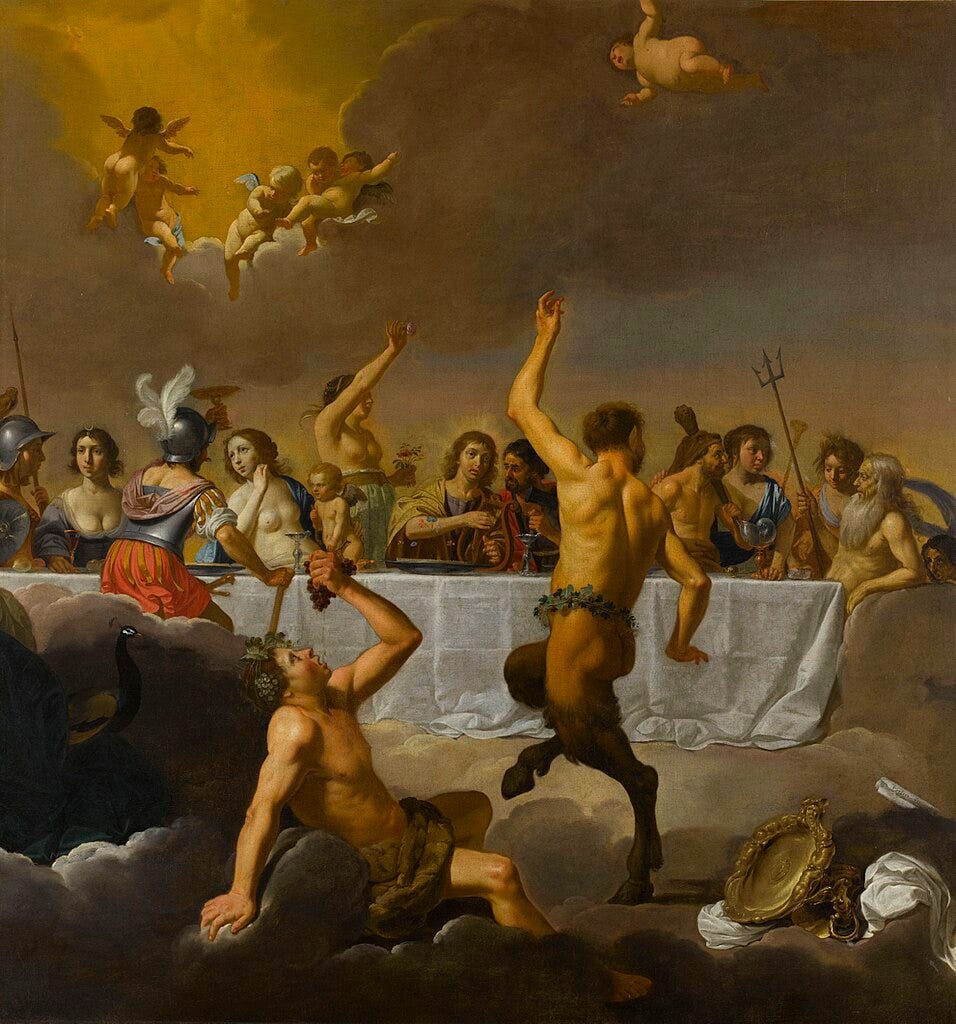
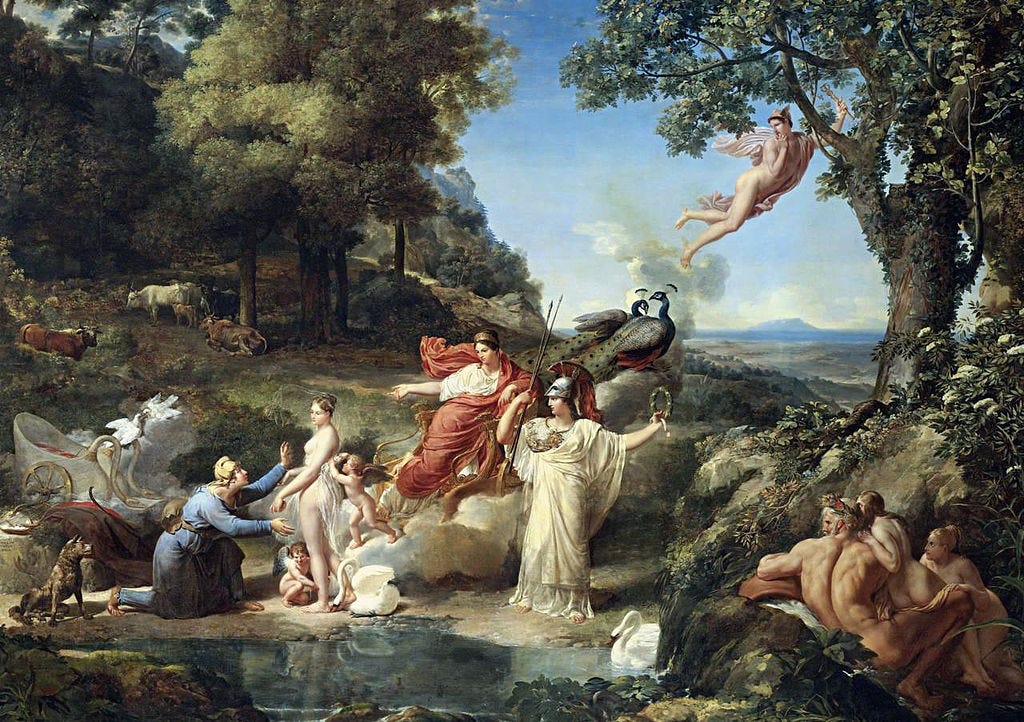
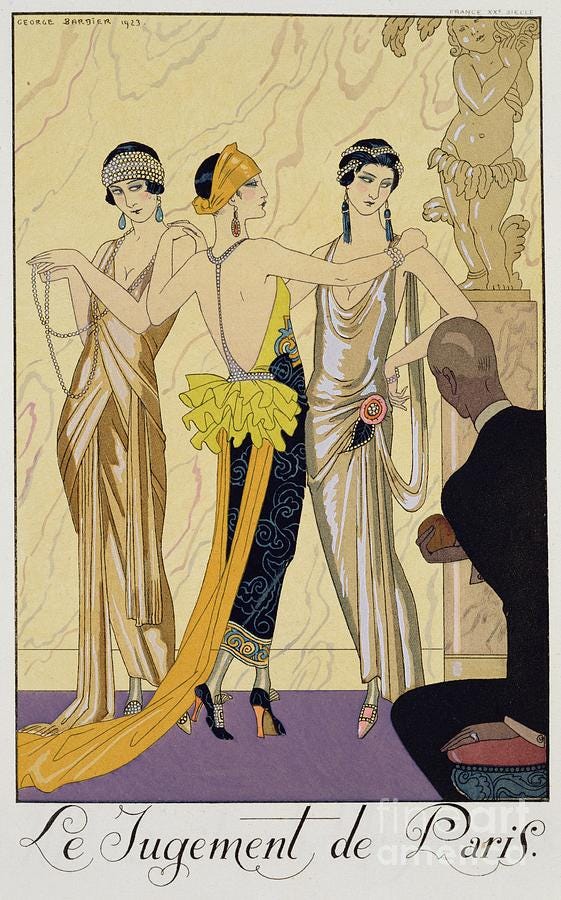
This has given me a lot to think about, particularly as I'm contemplating making the Judgement of Paris a focal point of a new novel.
My apologies if I misunderstood your point in ascribing faux outrage. People aren’t sophisticated and will latch on to a simple point in order to fight back when attacked comprehensively.
The whole ceremony seemed to be an inversion of everything decent about European culture and a celebration of its destruction. The feast part wasn’t even shown on the prime time evening broadcast unless I missed it somehow. They knew how over the top and offensive it was.
Christendom is being destroyed rapidly and its leaders are part of that process and will appeal to the lowest common denominator.
I haven’t watched anything since then. These ceremonies are important signals from the cabal about who and what they are up to. The Archaix YouTube guy did a breakdown of the London opening ceremony a few weeks ago that is hard to argue with.